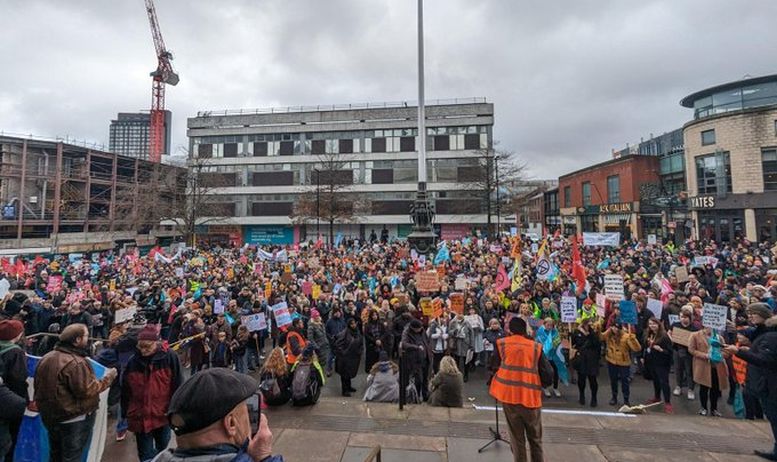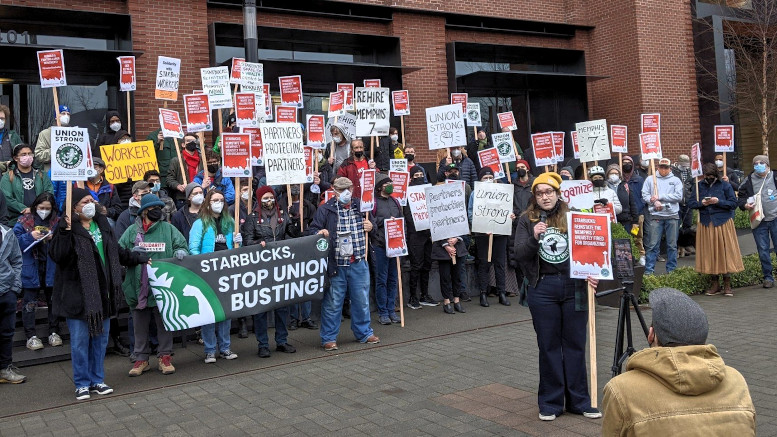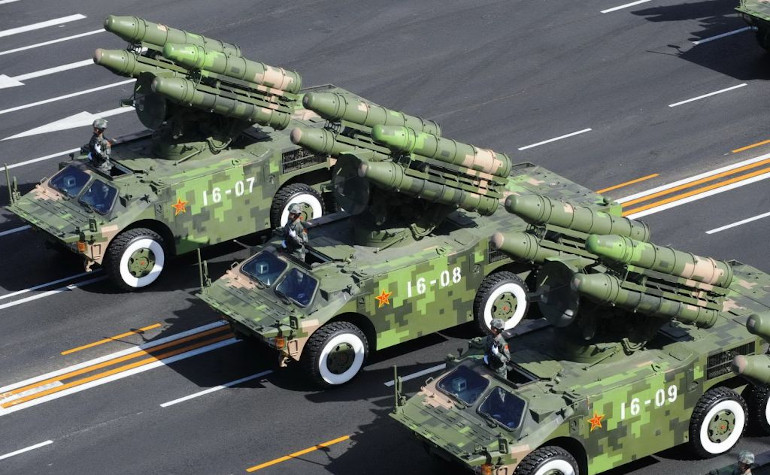Tom Costello is a member of Socialist Alternative (England, Wales & Scotland).
What Now for the Workers’ Movement?
The language of class war is the order of the day in Britain. As striking nurses have said on the picket lines: “Patients aren’t dying because we are striking. We are striking because patients are dying”, which has struck a huge nerve among the working-class majority. Workers know that the current on-going strikes are for our futures — the future of our health, our education and the services we all need.
December 2022 saw the highest number of workdays -1.5 million — lost through strikes since July 1989. This led up to Wednesday 1 February’s coordinated strike action, a hugely important first step in building working class resistance. It is estimated that over 500,000 walked out — 300,000 of whom were education workers in the National Education Union (NEU), 100,000 civil servants in the Public, Commercial Services Union (PCS), and 70,000 higher education workers in the University and Colleges Union (UCU). This was the single largest day of coordinated strike action since 2011, when 2 million took action in the public sector pensions dispute.
Let’s not forget that just three years ago, Boris Johnson and the Tories appeared to be riding high. The rife corruption, scandals, and economic chaos inflicted by British capitalism has now thrown their own system into crisis. This chaos can be seen in the daily experiences of millions of workers. Rail services, particularly in Northern England, have utterly collapsed. The numbers of teachers, nurses, firefighters and other ‘key workers’ have plummeted. Britain now of all the ‘advanced’ G7 countries has the deepest inflation and energy crisis.
Sunak, representing the interests of his fellow tax dodgers in government, has resorted to vicious union busting, alongside a propaganda campaign attempting to pit “extremist protestors and union bosses” against “hardworking Britons and schoolchildren”. His new proposed “Minimum Service Law” promises to very seriously undermine the democratic right to strike in key sectors, using state repression to throw back by centuries the rights of workers.
Despite their chest-beating, this government is not popular — in fact it’s widely hated. Sunak, upon taking over the reins, had to tell his party to “unite or die”. And the ‘unity’ which exists now is only paper thin. The Tories remain terminally divided.
General strike
1 February represents an important step on the road to the working class stepping up its fightback. However, it could have been bigger. Given the deep anger and willingness to fight, further coordinated action, with a buildup period in which unions can synchronise and escalate their actions could even drive the Tories from office. The entry of the firefighters and potentially junior doctors into the strike wave shows just how possible it is to broaden and deepen the action.
Socialist Alternative says the next immediate step for the struggle should be a massive day of coordinated strike action on the government’s budget day — 15 March. This must be part of a strategy of intensifying and escalating the action towards a general strike. Such an action would strike a deep blow to Sunak’s already crisis-ridden government and, if part of a sustained plan of action, could force them from office. What’s required is a worked out, democratic strategy to step up the disputes and broaden the action. But who will organise this?
Clearly, we cannot rely on the Labour Party leader Kier Starmer to even give an inch of support to workers fighting back. While unions have defended their members’ pay and condition, Starmer has sat at the World Economic Forum in Davos to rub shoulders with the billionaires of the world. We should know which side he sits on in the class struggle.
The Trades Union Congress — representing unions with a collected membership of around 6 million, would have tremendous authority and weight were it to lead a campaign building up towards a general strike. But such an approach has unfortunately been missing. New TUC General Secretary Paul Nowak for instance, while criticising the Minimum Services Bill, has limited his calls to leaving the fight to one in the courts. The courts are not on our side. These are the same courts which ruled just weeks ago against the rights of the Scottish people to hold a second referendum. They have time and time again sided with employers against our unions when it comes to disputes. This battle will only be won with mass action, striking around clear demands and preparing to defy unjust and undemocratic laws if needs be.
Millions have been inspired to see the health workers — nurses, ambulance workers taking historic action. Soon junior doctors will be entering into the fray after decades of NHS privatisation. These workers are part of the backbone of this struggle, whose action would have been strengthened further had their unions joined the coordinated strike date on 1 February, rather than holding action later the same week.
Unfortunately, the leaders of the Royal College of Nursing (RCN) have for now rejected talk of coordination outside health. This has so far seemingly been under the pretence of keeping the strikes ‘non-political’, and to avoid supposedly losing support by associating the health workers with ‘less popular’ strikes. But it is not true that the health workers are alone in getting high levels of public support. A recent poll of parents indicated 62% supported the teachers’ action. The rail strike, despite a relentless barrage of media propaganda about ‘rich train drivers on fat salaries’, still commands considerably more support than opposition. This only shows that actually, as the strike wave deepens and spreads, workers see what the unions are for. This encourages more to be willing to fight as part of our class.
Strategy to fight needed
Many of us already know that 1 February must only be the beginning if workers are going to win. But to make sure that this is fully brought on board in the next phase of struggle, we will have to fight to maximise the involvement of workers themselves in democratic decision making over when and how we strike together. This could mean setting up cross-union strike committees and regular workplace meetings, involving the widest layer possible.
Regular conferences of workplace reps across unions regionally and nationally could now be held — these would in effect be conferences of resistance, where we can discuss next steps for the action, but also place maximum pressure on, and if necessary, replace those leaders who are unwilling to fight, with those who are.
Where there is clear support in society for the strikes, community groups could be set up to lead this and turn passive support into active support — drawing in parents and students making solidarity visits and publicising picket lines. The massive support for the Rail and Maritime Trade Union (RMT) seen on numerous radical Pride events last summer shows the potential also for “LGBTQ+ solidarity with striking workers” initiatives to be launched.
The Enough is Enough campaign (EIE), launched in August 2022 could still play a crucial role in pulling this together. Aside from some vibrant local demonstrations (many of which have had Socialist Alternative actively involved in building the campaign), EIE has overall been under-utilised. However, the fact that the recently launched online petition to defend the right to strike has so far gained over 164,000 signatures shows that many workers are still looking towards the EIE campaign. This is why Socialist Alternative members helped launch a national petition calling on EIE to play a role in mobilising its hundreds of thousands of followers into action in the run up to 1 February.
A massive strike on 15 March could mark the beginning of showing even further the immense power that workers, when organised, can wield in order to change society. For Socialist Alternative, that real change can only take place by breaking with the parasitic, for-profit system of capitalism. We fight for nationalisation of rail, mail, energy and the giant corporations which dominate our economy, under the democratic control of working-class people. If this is the future you want to fight for, contact us and get involved today!



